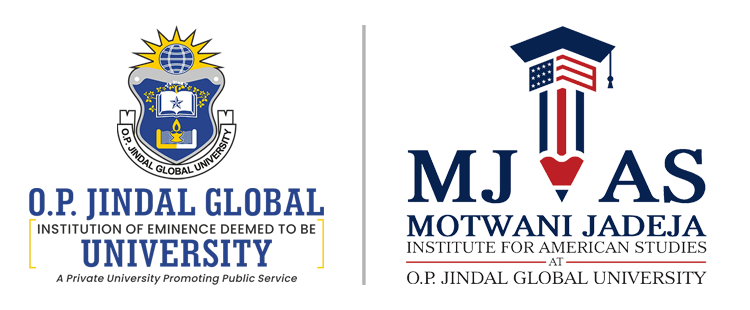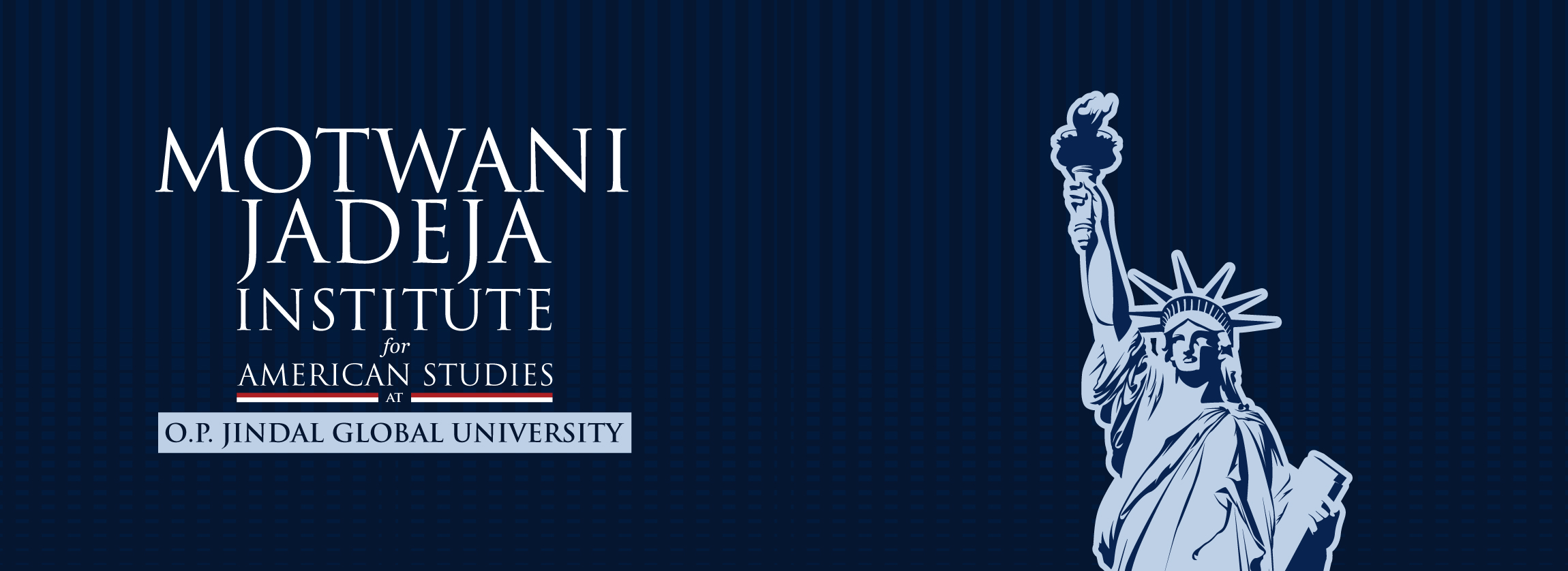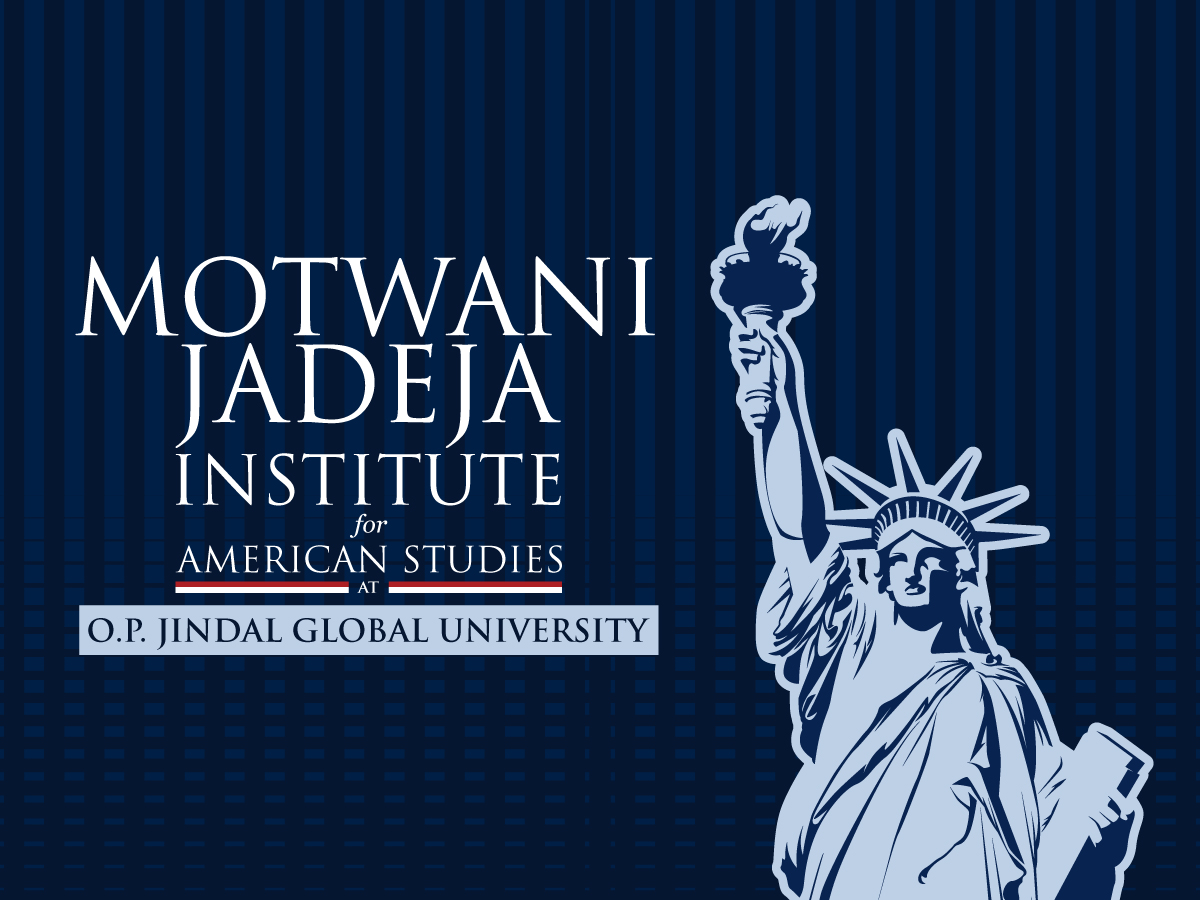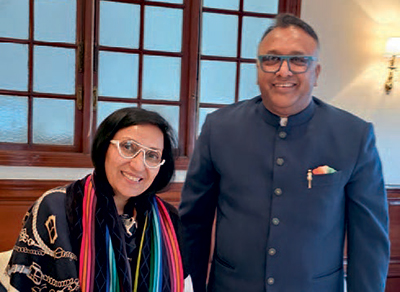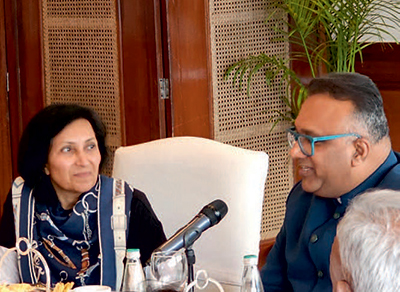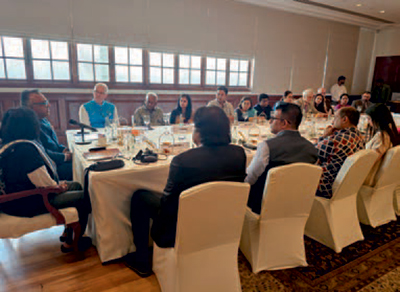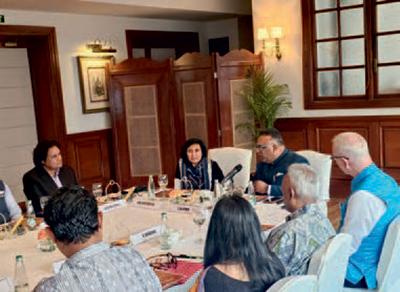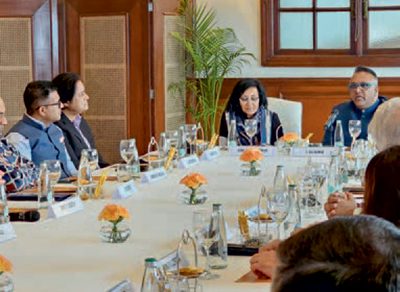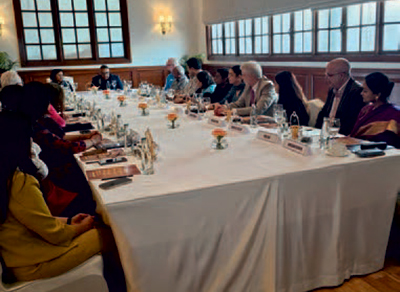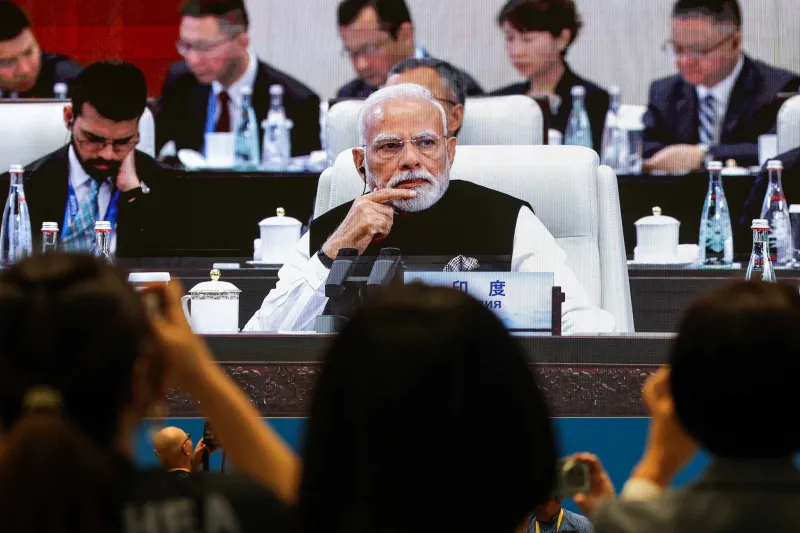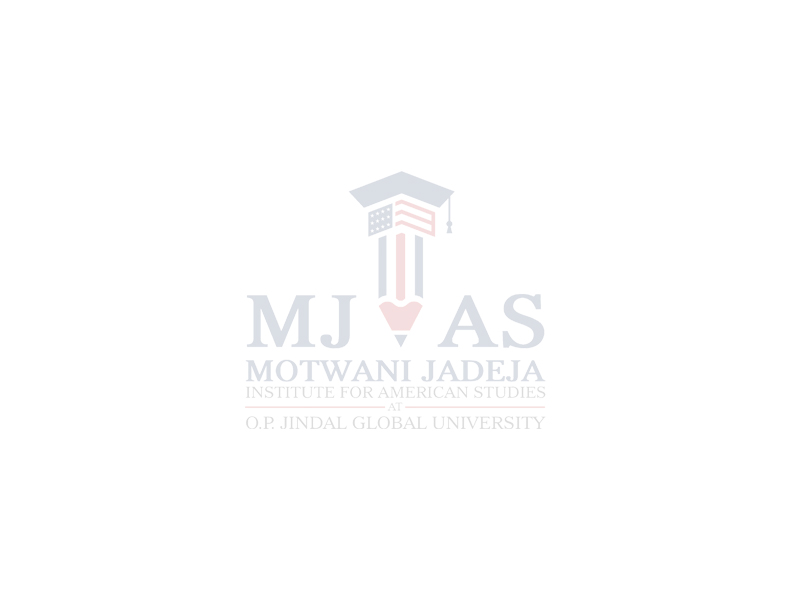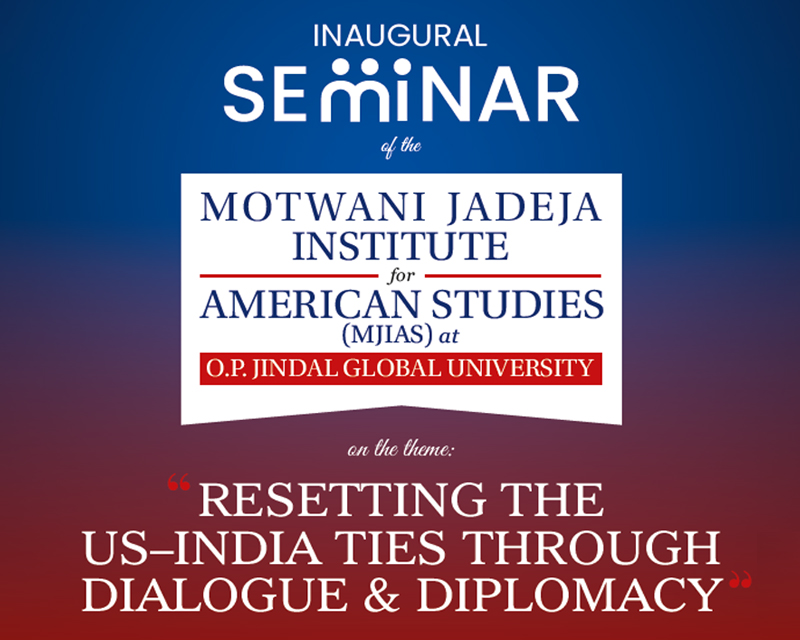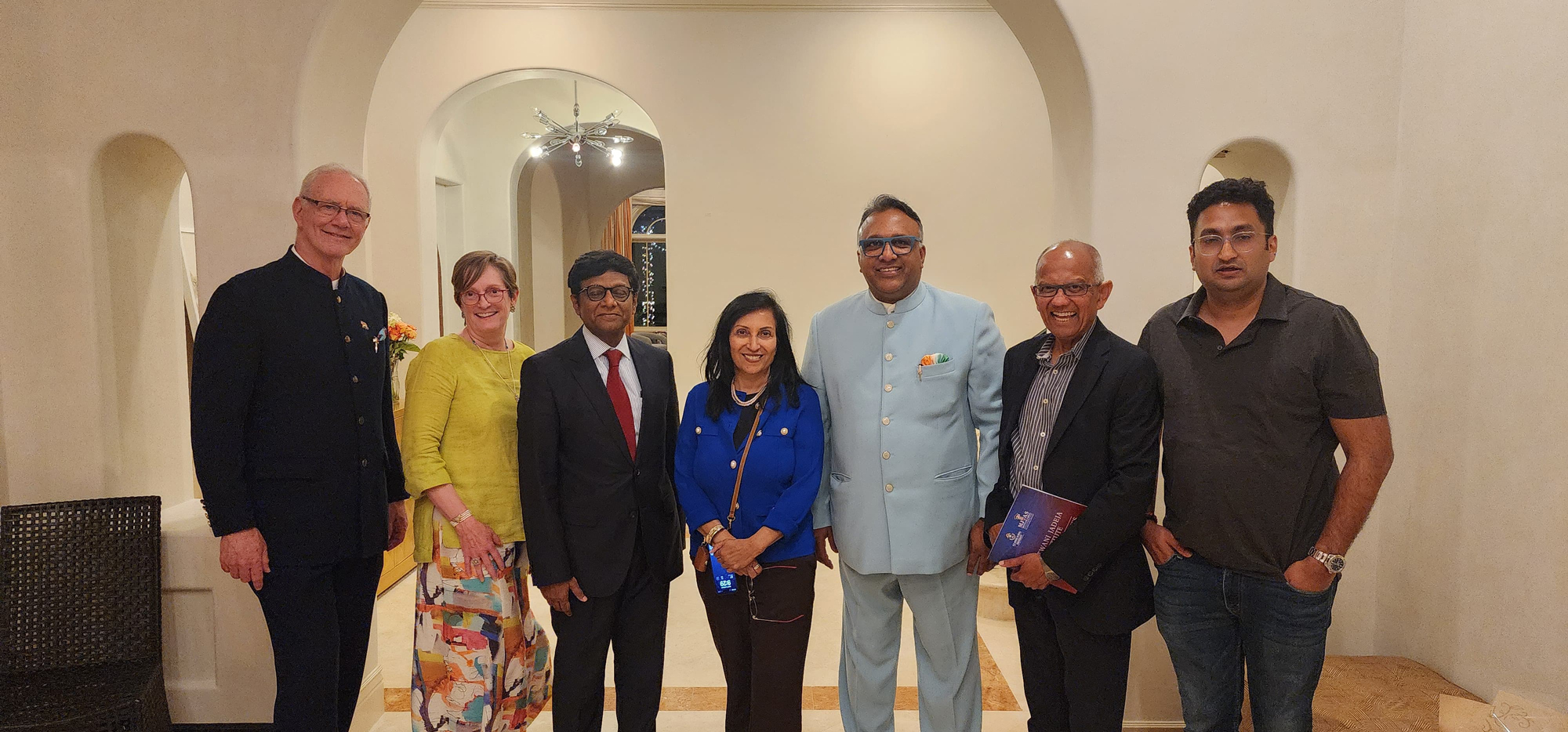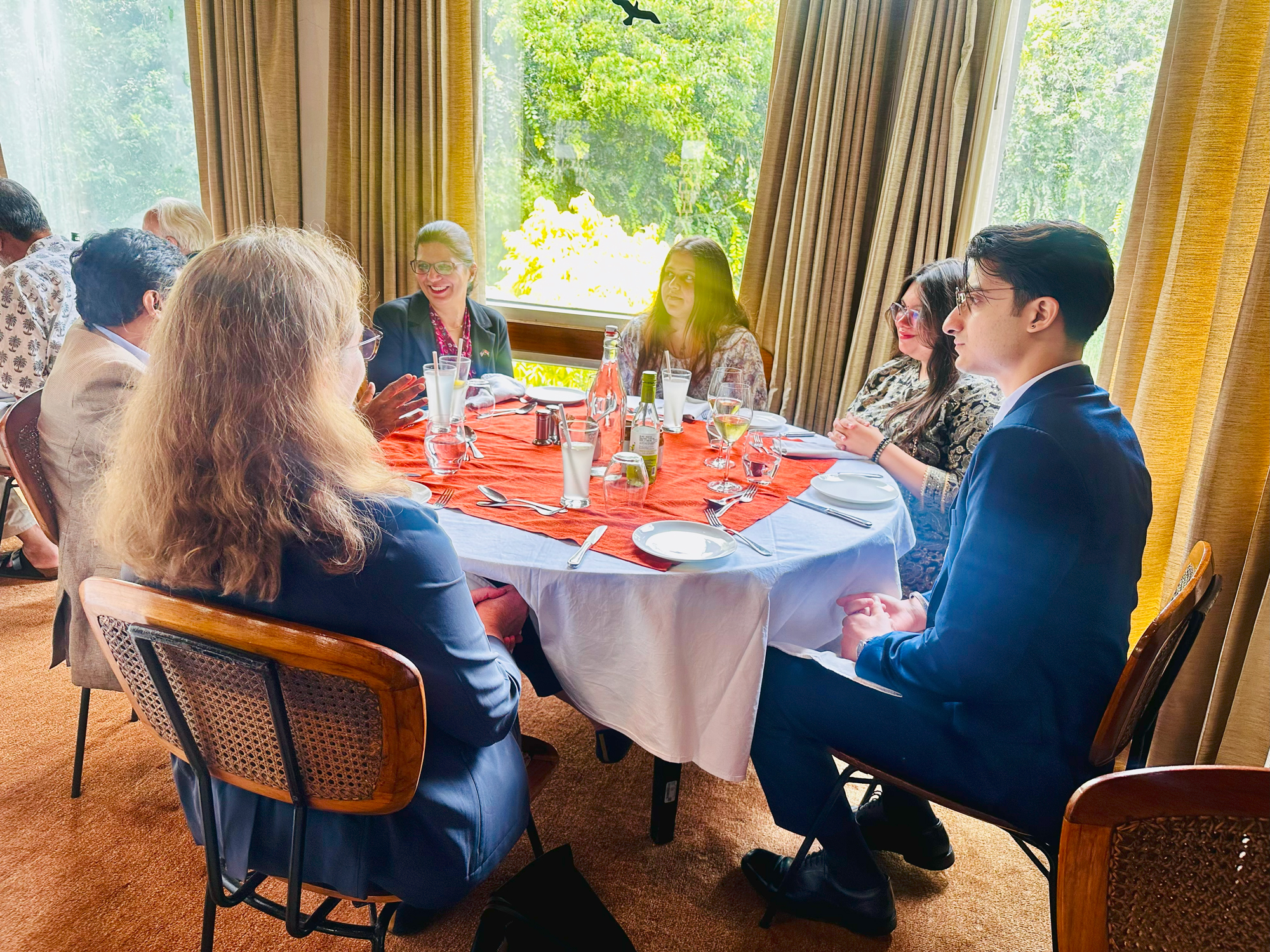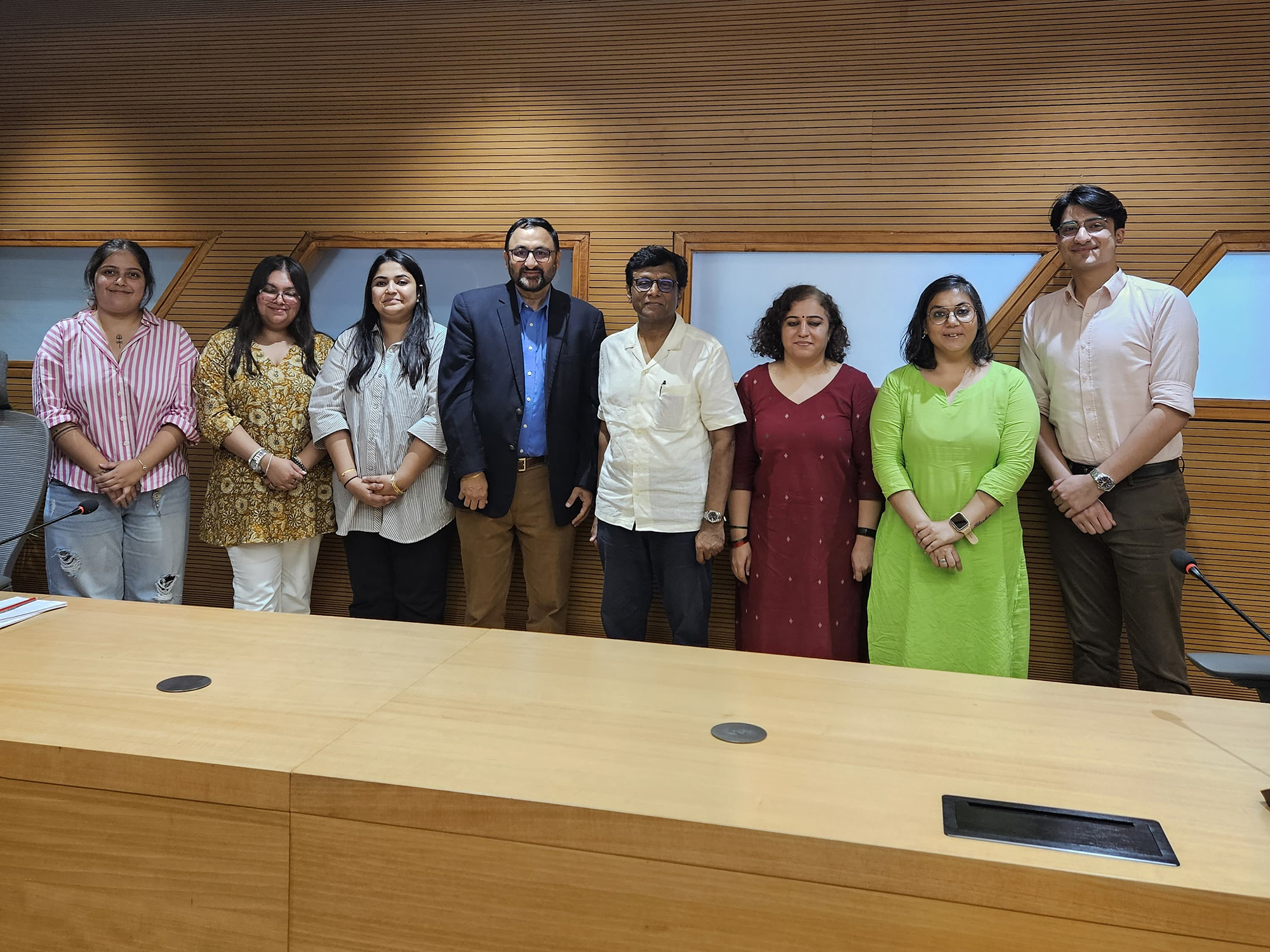The Motwani Jadeja Institute for American Studies (MJIAS) is envisioned as a premier interdisciplinary institute at O.P. Jindal Global University (JGU), dedicated to advancing scholarly research , education , dialogue , and policy engagement on the United States of America.
Envisioning MJIAS
First Meeting with Ms. Asha Jadeja Motwani
On April 20, 2025, at The Imperial Hotel, New Delhi, Ms. Asha Jadeja Motwani met with Professor (Dr.) C. Raj Kumar, and Deans and senior faculty members of O.P. Jindal Global University, to engage in a meaningful conversation envisioning the mission and future of the Motwani Jadeja Institute for American Studies (MJIAS).

About MJIAS
The Motwani Jadeja Institute for American Studies (MJIAS) is envisioned as a premier interdisciplinary institute at O.P. Jindal Global University (JGU), dedicated to advancing scholarly research, education, dialogue, and policy engagement on the United States of America (USA). The Institute is made possible through a generous grant from the Motwani Jadeja Family Foundation, in honor of the late Professor Rajeev Motwani, whose contributions to technology, entrepreneurship, and scholarship continue to inspire generations.
This Institute reflects the visionary philanthropy of Ms. Asha Jadeja, whose leadership in empowering academic institutions, civic engagement, and cross‑border collaborations has been instrumental in shaping intellectual landscapes globally.
She is a globally respected philanthropist, venture capitalist, and social innovator. Asha Jadeja has dedicated her life to empowering entrepreneurs, supporting grassroots movements, and fostering democratic values. Her foundation has played a pivotal role in building bridges between India and the USA by investing in innovation, market‑based solutions, education, and the arts across both countries.
Her commitment to open knowledge systems, women’s leadership, and civic engagement has led to transformational change. The MJIAS embodies her vision to create lasting institutions that promote dialogue, collaboration, and mutual understanding between India and the United States.
In a world marked by geopolitical shifts, economic interdependence, technological disruption, and sociopolitical challenges, the need for a robust and nuanced understanding of the USA — as a global power and a key partner to India — is more critical than ever. The MJIAS seeks to fulfill this need by serving as a unique platform for research, dialogue, and collaboration between India, the USA, and the world.
“In addition to being a brilliant computer scientist, Rajeev was a very kind and amicable person and his door was always open. No matter what was going on with my life or work, I could always stop by his office for an interesting conversation and a friendly smile. Even though I was just one of hundreds of graduate students in the department, he always made the time and effort to help. Later, when Larry and I began to work together on the research that would lead to Google, Rajeev was there to support us and guide us through challenges, both technical and organisational.”
SERGEY BRIN- Co-founder, Google
About Rajeev Motwani
Rajeev Motwani (March 26, 1962 – June 5, 2009) was a professor of Computer Science at Stanford University whose research focused on theoretical computer science. He was an early advisor and supporter of companies, including Google and PayPal, and a special advisor to Sequoia Capital. Rajeev was born in Jammu and grew up in New Delhi. As a child, inspired by luminaries like Carl Friedrich Gauss, he wanted to become a mathematician. Motwani went to St Columba’s School, New Delhi. He completed his B.Tech in Computer Science from the Indian Institute of Technology Kanpur in 1983 and got his Ph.D. in Computer Science from the University of California, Berkeley in 1988 under the supervision of Richard M. Karp.
Rajeev joined Stanford soon after U.C. Berkeley. He founded the Mining Data at Stanford project (MIDAS), an umbrella organization for several groups looking into new and innovative data management concepts. His research included data privacy, web search, robotics, and computational drug design. He is also one of the originators of the Locality‑sensitive hashing algorithm.
Rajeev was one of the co‑authors (with Larry Page, Sergey Brin, and Terry Winograd) of an influential early paper on the PageRank algorithm. He also co‑authored another seminal search paper What Can You Do With A Web In Your Pocket with those same authors. PageRank was the basis for search techniques of Google (founded by Page and Brin), and Motwani advised or taught many of Google’s developers and researchers, including the first employee, Craig Silverstein. Rajeev was an author of two widely used theoretical computer science textbooks꞉ Randomized Algorithms with Prabhakar Raghavan and Introduction to Automata Theory, Languages, and Computation with John Hopcroft and Jeffrey Ullman.
About Rajeev Motwani

About Rajeev Motwani
Rajeev Motwani (March 26, 1962 – June 5, 2009) was a professor of Computer Science at Stanford University whose research focused on theoretical computer science. He was an early advisor and supporter of companies, including Google and PayPal, and a special advisor to Sequoia Capital. Rajeev was born in Jammu and grew up in New Delhi. As a child, inspired by luminaries like Carl Friedrich Gauss, he wanted to become a mathematician. Motwani went to St Columba’s School, New Delhi. He completed his B.Tech in Computer Science from the Indian Institute of Technology Kanpur in 1983 and got his Ph.D. in Computer Science from the University of California, Berkeley in 1988 under the supervision of Richard M. Karp.
Rajeev joined Stanford soon after U.C. Berkeley. He founded the Mining Data at Stanford project (MIDAS), an umbrella organization for several groups looking into new and innovative data management concepts. His research included data privacy, web search, robotics, and computational drug design. He is also one of the originators of the Locality‑sensitive hashing algorithm.
Rajeev was an avid angel investor and helped fund a number of startups to emerge from Stanford. He sat on boards including Google, Kaboodle, Mimosa Systems (acquired by Iron Mountain Incorporated), Adchemy, Baynote, Vuclip, NeoPath Networks (acquired by Cisco Systems in 2007), Tapulous and Stanford Student Enterprises. He was active in the Business Association of Stanford Entrepreneurial Students (BASES).
Rajeev was a winner of the Gödel Prize in 2001 for his work on the PCP theorem and its applications to hardness of approximation. Rajeev served on the editorial boards of SIAM Journal on Computing, Journal of Computer and System Sciences, ACM Transactions on Knowledge Discovery from Data, and IEEE Transactions on Knowledge and Data Engineering.
RAJEEV MOTWANI
(March 26, 1962 – June 5, 2009)
Vision
The Motwani Jadeja Institute for American Studies aspires to be a globally recognized centre of excellence that fosters interdisciplinary scholarship, informed dialogue, and impactful engagement on the United States of America, while promoting stronger India‑US relations and contributing to global conversations on pressing challenges.
Mission
- To promote comprehensive research and teaching on the United States in all its dimensions – political, economic, social, cultural, historical, legal, and technological.
- To foster academic, policy, and public dialogues on global issues where the US plays a significant role.
- To build bridges between academia, industry, civil society, and governments of India and the United States.
- To facilitate interdisciplinary collaborations and strengthen India‑US scholarly and diplomatic relations.
- To honor the legacy of Rajeev Motwani and advance Asha Jadeja’s vision of knowledge driven philanthropy and international cooperation.
The Need & Importance of Establishing MJIAS
The establishment of the MJIAS is timely and significant due to several global and regional factors.
Geopolitical Shifts
India-US Strategic Partnership
Technology and Innovation
Global Challenges
Academic Exchanges for Core National Interests
Objectives of the Institute
Key Initiatives & Activities

Governance & Leadership
Networks and Collaborations
The MJIAS will forge strategic collaborations with premier universities, think tanks, policy institutes, and international organizations in the US and globally to advance its objectives. JGU already has academic collaborations with several leading American universities, which the MJIAS will leverage and expand. These partnerships provide a strong foundation for faculty and student exchanges, joint research, and collaborative programs under the aegis of MJIAS.
Some of the notable existing partnerships are as follows꞉
Five‑Year Strategic Roadmap & Plan of Action
